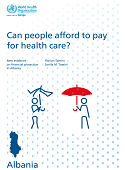Can people afford to pay for health care? New evidence on financial protection in Albania (2020)

Download
by Florian Tomini, Sonila M. Tomini
2020, xiv + 79 pages
ISBN 978 92 890 5529 1
This publication is only available online.
This review is part of a series of country-based studies generating new evidence on financial protection in health systems in Europe. Financial protection is central to universal health coverage and a core dimension of health system performance.
Financial protection in Albania is weak compared to many other European countries. Catastrophic health spending is heavily concentrated among the poorest households and largely driven by out-of-pocket payments for outpatient medicines. Levels of unmet need for health and dental care are also high.
Significant weaknesses in the design of coverage policy, as well as informal payments and low levels of public spending on health increase people’s exposure to out-of-pocket payments, particularly poor people.
To improve access to health care, and financial protection, the health system should:
- close the large gap in population coverage by de-linking entitlement to mandatory health insurance coverage from payment of contributions;
- increase protection against out-of-pocket payments for outpatient medicines, starting by exempting low-income households from user charges (co-payments);
- expand dental coverage for adults, to reduce unmet need;
- address informal payments in public facilities;
- support changes to coverage policy by increasing public investment in health.



